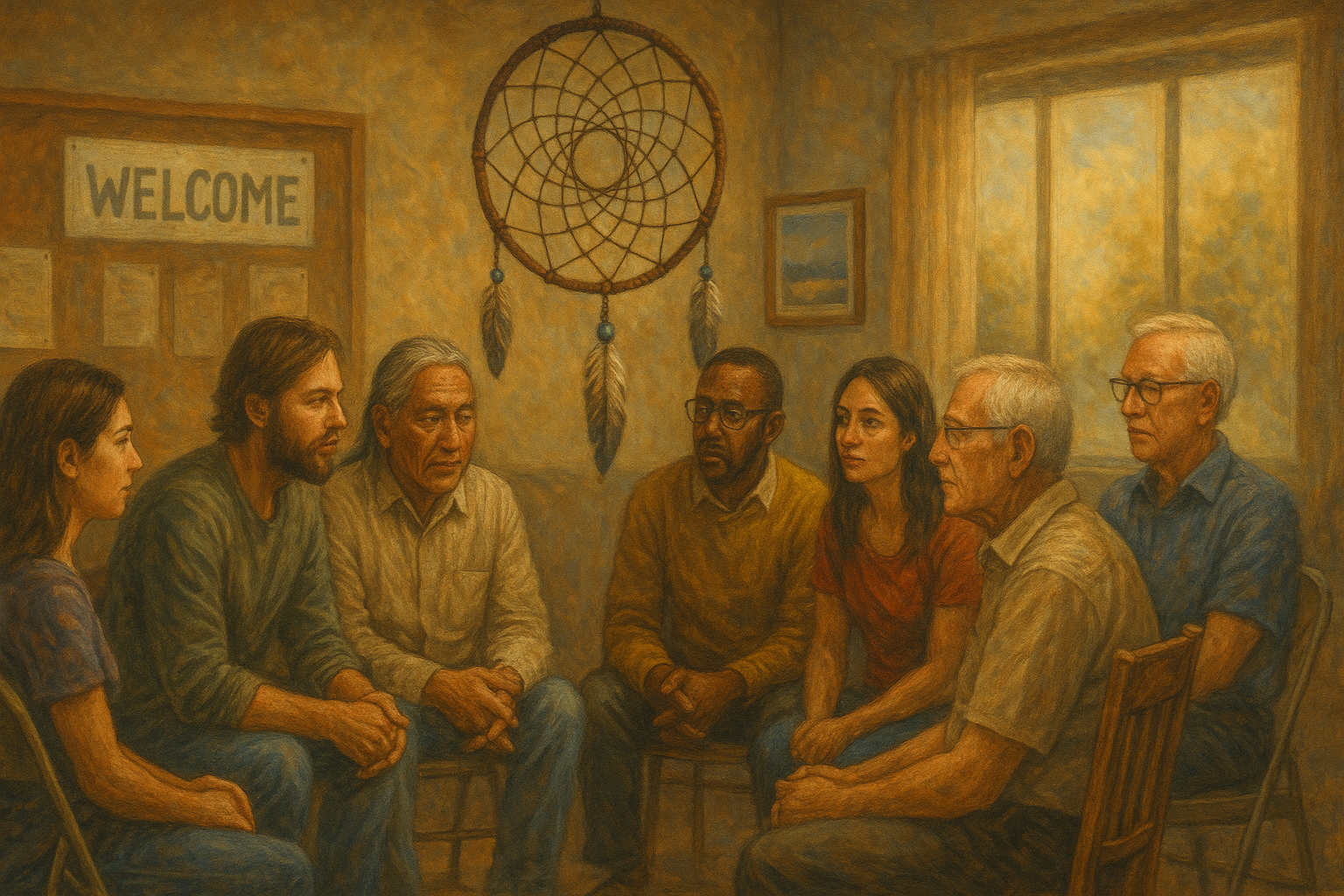READ IT TO ME: Click Play To Listen To This Post
“Two Roads diverged in a wood,
I took the one less traveled,
And that has made all the difference.”
– Robert Frost
An addict contemplating recovery sees only two options. It is either use or die with craving. Addicts don’t usually die with cravings but they habitually succumb to acting out. In the beginning days of recovery, addicts are poor at creating options. They come from an either/or, black/white world. They either use or obsess about using until the craving has subsided.
People live with shame and pain. They live disconnected from their inner self. Most of us long for connection. Mindlessly, we listen to the radio or to a podcast when driving. Aimlessly, we scroll texts, emails, and a host of social media platforms disengaged and lost in the spectacle of it all. For an addict, any reason is a good reason to use. In recovery, creating options to using requires that you take the road less traveled. There are no shortcuts. There is no room for perfection. It requires a willingness to endure painful moments, relentless perseverance, and a commitment to being a little better today than you were yesterday.
Along the road, there will be a dawning that you are a spiritual being having a human experience. This will transform your struggle into sacred meaningfulness. This awareness is hallowed throughout 12-step rooms across the world. Carl Jung once concluded that what chronic addicts needed was a spiritual experience and ongoing communal support.
Most addicts in recovery settle for sobriety. Certainly, it beats the hell out of wallowing in the pain and distortion from a life lived in the agony of addictive behavior. Yet, few engage the worn road less traveled. Once you have put the cork in the bottle, what is next? Are you willing to go deeper? Are you willing to explore what is missing? Are you curious to understand why the addiction? Why the pain? Do you want to address that feeling in your gut that you are not good enough? These questions and more represent the gateway to a worn road less traveled. To those who have committed to sobriety and who are no longer content to rotate the object of addiction, I offer the following road markers on the worn road less traveled.
1. Adopt a mindset for recovery: Practice brainstorming more than one option for every challenge you face. Breakthrough the either/or mentality. Change your language about how you see yourself and the world around you. Dare to dream about creating the kind of person you want to be. Figure out what your song is and sing it. The expedition in recovery truly begins when you earnestly are willing to truly change your mindset about addiction, yourself, and the world around you.
2. Become a Sponge: What has helped me to be successful in my world of endeavor is that I became a sponge to learn everything I could to be the best I could be. I was a minister in a church for over 25 years. During the beginning days of my training, I worked for three years for free, with whom I thought was the very best. I asked so many questions that the lead pastor asked me to stop asking so many questions. Today I am proud that I learned to be a sponge in ministry and as a professional counselor. That said, it saved my life in recovery. Early in recovery, I adopted the mindset of learning everything I could about recovery. It is one of the fundamentals that has projected my personal growth during the past 33 years in recovery. Be a sponge!
3. Learn to fail forward: People who embrace a healthy recovery mindset create a paradigm shift in their thinking about failed behavior. They make it exciting. They realize that within their failure are lessons to learn that will help them become a little better today than they were yesterday. Rather than wallow in the mud of shame and negative thinking, they practice conditioning themselves to pursue a better way to live. They learn to transform the word excitement from a necessary feeling to a committed action of exploring what went wrong and doing something different.
4. Practice Playback: This road marker is related to the previous one. When an addict relapses, it is common to admit the destructive behavior and then get back on the horse and try again. It is often brushed off with the idea that “I’m an addict” and what needs to happen is that I just need to bear down with my recovery skills. Sometimes, they commit to going to 90 meetings in 90 days or start again doing the 12 steps. What often is overlooked is the importance of playback. When addicts admit their failure to their support community, what is left out is why they relapsed and what happened. What often is overlooked is the importance of playback. It is crucial to go back and unpack what happened and where the breakdown was. A golfer will learn to improve his/her swing by watching videos of past swings. A basketball player will learn where they were out of position and how to correct other mistakes by watching past videos of performances. A recovering addict needs to do the same. Go back and fastidiously review triggers, build-up behaviors, and mistaken beliefs that dominated and then practice over and again replacement behavior that corrects what broke down. We never become perfect. But playback will help you become incrementally better than before. So, practice playback and pay it forward with an incremental positive change that over time will make a profound difference.
5. Protect your imagination and get outside your comfort zone: It is counterintuitive for an addict to embrace discomfort. Running from emotional and physical pain is at the root of why addiction grows in the first place. Though contraindicated, in recovery an addict learns to lean into the pain and sit with it. Recovery requires that you get outside your comfort zone. Only when you do this, are you able to give birth to the person that your destiny is pulling you toward. The worn road less traveled demands that you live outside your comfort zone. This is where the problem is. Once sober from the hectic helter-skelter life of addiction and within the warm and friendly confines of a 12-step community, an addict is asked to push toward living outside of his/her comfort zone. It requires sensitivity to the support of the community while pushing forward to dream and realize your destiny. In doing so you must protect your imagination from the negative messages of “you can’t” or “who do you think you are.” You must protect your imagination from the impact of your personal failures or others who subtly want to pull you back into an old mindset. It is a road less traveled for those who live outside their comfort zone. Laying it on the line and pushing the boundaries of your comfort zone will require a commitment to being the best person you can be one day at a time. Sometimes you will take 2 steps forward and then 3 steps backward. Everyone slips even as they soar. Overcome your setbacks by doing the next right thing regardless of how you feel. You won’t think your way into acting differently. You will act your way into a different way of thinking. Don’t abandon your quest to fulfill your imagination. Stop flogging yourself with negative messages. Every positive thought and action will move you closer to your desired transformation. The worn road less traveled requires that you protect your imagination and live outside your comfort zone.
6. Choose your support community carefully and elevate those around you: One of the biggest challenges for an addict is to create an environment that fosters sobriety and personal growth. Most addicts have not surrendered to recovery behavior and hang around old friends who either influence them to return to addictive behavior or who thwart their vision of fulfilling their destiny. Like the old saying, “Hang around the barbershop long enough and you will get a haircut”, many addicts can testify to the reality of this powerful truth! The worn road less traveled in recovery will require that you weed out those who bring you down. You will need to distance yourself from the dream crushers around you. Don’t let them rent premium space in your mind. Foster a web of influence that will inspire you to achieve and transform yourself and hold you accountable to your imagination. Build an environment where half-assed efforts are unacceptable. Cultivate your brilliance by choosing a support community that expects greatness within. Create a support system that you can solicit counsel from those who will inspire you. Always know that on the worn road less traveled, life transformation is a team sport.
When I wrote the book Dare to Be Average, Cultivating Brilliance in the Commonplace the emphasis was the opposite of half-hearted living. Rather, it is about taking the worn road less traveled and embracing the common everyday moment—even those that provide emotional discomfort—and mining meaningfulness from each one. This pursuit of meaningfulness is required in recovery for those who choose the worn road less traveled.





